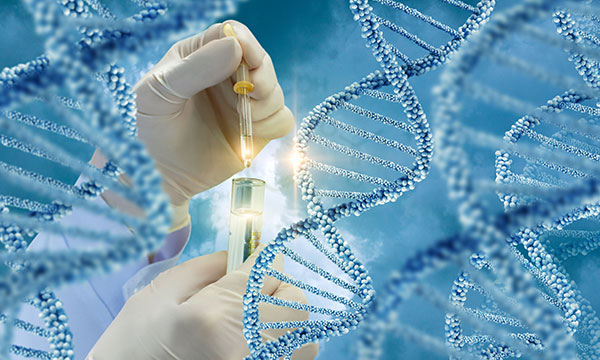
Recreational genetic testing is becoming increasingly popular. Ancestry.com has more than 6 million test takers in their AncestryDNA database. Last spring, 23andMe began offering direct-to-consumer tests for ten more genetic diseases, among them Parkinson’s and Alzheimer’s disease, and was authorized by the FDA this month to include three variants in the BRCA1 and BRCA2 genes associated with breast cancer.
Is this a good way to get information about your genetic health? Should it matter that physicians or genetic counselors are not part of the equation in how consumers interact with these tests? Anyone may simply buy the test online, send in a sample of saliva—from which their DNA will be extracted—and then turn to the company’s website if they have questions regarding the results.
Sara Brown, MS, one of ARUP’s 16 genetic counselors, provides more information on what consumers of these tests should know.
Is anything wrong with depending on direct-to-consumer tests for health information? After all, pregnancy tests have proven to work just fine without a healthcare provider needing to be involved.
It is important to understand that direct-to-consumer genetic testing should be considered “recreational,” or for entertainment purposes only. Most companies that offer this testing, but not all of them, are generally upfront with the fact that these tests should not be used for making medical decisions.
These tests can uncover interesting bits of information about your genes, but they do not replace the need for diagnostic testing ordered by a healthcare provider based on your personal or family history. Much like a pregnancy test, the medically significant results of recreational genetic testing need to be confirmed by retesting at a clinical laboratory (which requires a physician’s order), and may prompt subsequent medical evaluations and discussion with a healthcare provider about further medical management, if any.
Sara Brown, MS, LCGC“Any medically actionable result found by recreational DNA testing should be confirmed in a laboratory that is certified to perform medical testing. In addition to the accuracy of the result itself, it is also important to make sure that the information provided with that result and conclusions drawn from it are based on medically sound (scientifically legitimate) data.”
One of 16 genetic counselors at ARUP Laboratories.
Does it really matter if a genetic counselor or physician is not involved?
In certain instances, interpreting a recreational DNA test is fairly straightforward and can be done without involving a medical professional. For example, learning where your ancestors came from or predicting your eye color based on genetic variants in your DNA is easy to understand and has a low impact on your health. However, in other instances, it is important to include a genetic counselor or other healthcare provider in the discussion when the test results have significant health consequences or are complex and potentially confusing, such as learning you are a carrier for a recessive disease or that you have an increased risk for developing breast cancer. The information that a recreational DNA test can provide is only one small part of the overall picture of your health and should be interpreted along with several other important factors. A healthcare provider can look at the whole picture with you—including the DNA results and their limitations, your own health history, and your family health history—to help you understand what the DNA results do or do not tell you.
Are these genetic tests accurate?
The answer to this question varies depending on the company offering testing. Different companies have demonstrated different laboratory standards and result accuracy. While, in general, the results can probably be trusted, there have been reports of companies giving incorrect results. For this reason, any medically actionable result found by recreational DNA testing should be confirmed in a laboratory that is certified to perform medical testing. In addition to the accuracy of the result itself, it is also important to make sure that the information provided with that result and conclusions drawn from it are based on medically sound (scientifically legitimate) data. Genetic counselors or other healthcare providers can help consumers tease out the facts from the hype.

Are there psychological factors that consumers should be aware of based on their test results?
There are several pitfalls related to DNA testing that consumers should understand before undergoing testing. First, there is a potential for unexpected results. DNA tests may reveal that biological relationships between you and your family members are not what you previously thought. Or, you may find out that you’re at high risk for a disease that does not yet have a cure. These findings can be very stressful to some people.
Second, a negative or normal DNA test does not mean you’re home-free. False reassurance is a significant issue with this type of testing because the information gained is quite limited. For example, if your test is negative for three specific genetic variants in the BRCA1 and BRCA2 genes, it does not mean that you aren’t at risk for breast cancer. There are hundreds of other variants that could be present that the test does not cover (not to mention the many other genetic and environmental factors that affect breast cancer risk that have nothing to do with BRCA1 and BRCA2).
Third, just like consumers who are at risk for false reassurance from these tests, they can also be at risk for misattributing their health problems to their genetic test results. Recreational DNA testing is not able to diagnose disease, so a positive result does not necessarily mean that a person has or will develop disease. Even if you have symptoms, a full evaluation by a healthcare provider is necessary to establish a diagnosis.
What advice would you give someone considering this type of DNA testing?
- Do your research. Before you spit in that tube, make sure you understand what the test can and cannot tell you so that you’re not surprised or disappointed by the results. Different DNA tests address different questions, and they all have significant limitations to consider.
- Read the fine print. Find out what the company plans to do with your DNA sample (i.e., discard it, use it for research, store it for future use, etc.) and how they protect your privacy, as well as what information is shared and with whom. Make sure you’re comfortable with the company’s policies. Once you hand over your sample, you may or may not have control over what happens to it or the genetic data that comes from it.
- Most importantly, talk to your doctor or genetic counselor if you have questions about your test results before you make any medical decisions. In fact, talk to your doctor if you have any questions or concerns about your personal or family health history regardless of the results of DNA testing!
- To find a genetic counselor near you, check out https://www.findageneticcounselor.com.
Sara Brown, MS, LCGC, is one of 16 genetic counselors at ARUP Laboratories. She supports the Molecular Genetics Laboratories, including Genetics Sequencing, Fragment Analysis, and Genomics. ARUP hired its first genetic counselor in 2002 after recognizing the value genetic counselors could bring to the company by assisting clients with test ordering and interpretation. One of the first tasks they took on was reviewing genetic tests that were very specific and prone to ordering errors.
Related blog
















